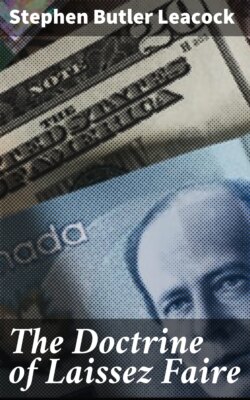Читать книгу The Doctrine of Laissez Faire - Стивен Ликок - Страница 4
На сайте Литреса книга снята с продажи.
I
The Physiocratic Doctrine of the State
ОглавлениеTable of Contents
It is the purpose of this thesis to trace the evolution of opinion in reference to the economic functions of government. The Physiocratic theory of the middle of the eighteenth century offers for this a starting-point that is neither artificial nor arbitrary.
Not earlier than this period do we find fully evolved the modern conception of the political basis of government,—the idea of government resting on the sovereignty of the people (whatever its particular formal aspect may be), and exercised in the interest of all. In the preceding centuries, government, in the sense of authoritative control, had always existed. The element of social control—patriarchal, military, feudal or regal,—is as old as the history of mankind itself. Yet it is incorrect and illogical to link together the analysis of the economic functions of modern government and the discussion of the practice of earlier monarchical establishments and the views, ideas and treatises bearing thereon.
Throughout the middle and early modern ages, the general aspect of government was that of a personal proprietary affair. Kingship was not an office but an ownership, or, at the most, a diluted form of ownership that may best be described as a status. This fact lies broadly reflected in the fiscal and administrative forms of the English government of the present day. The King’s courts, the King’s dominions, the King’s thanks to his Commons for the supplies they have voted for his use, by means of which the King’s armies have pacified the King’s dominions—all this is but the survival of the epoch when the King in literal fact stood as a proprietor, living, or failing to live, ‘on his own.’ It is the empty shell from which democratic government has long since been hatched.
Now the scope of governmental action under conditions of semi-proprietary Kingship is not logically to be identified with the scope of government viewed as an agency of common welfare. Very naturally its action extended wherever self-interested interference might obtrude itself. Hence the oft quoted wide interference of government in earlier times, even in early modern times. The central aim was the fortification of the monarchy, not the equitable interest of the individual citizen. Even the Elizabethan legislation, or the more illustrative legislation of Colbert,—the tariff, the monopoly companies, the model factories, the population pensions etc.,—even these, in spite of their possible stimulating effects upon national life, are not justly to be viewed as analogous to an extended economic scope of democratic government. They belong to a different view of political theory: they argue merely the obtrusive and at times salutary officiousness of an interested monarchical establishment.[1]
With all this also there must be ruled out of court, as not bearing on the present discussion, the earlier treatises, counsels and suggestions as to the policy, expediency and manner of such monarchical interference. Machiavelli’s book is, in plain fact, a manual of statecraft: The Cameral Science of the German princelings is a body of precepts analogous to hints on the good stewardship of an estate. The whole of Mercantilism, so-called, rests on no general theory of a common welfare state. It is a merely mechanical total composed of the different items of separate individual interest.
It is important to realize the essential difference between the so-called wide interference of government in the past and the extension of governmental functions occurring in the present day: the more so as it has been so widely misconstrued. Looking only to the fact of elaborate monarchical interference in the Middle Ages and to the equally obvious facts that the era of extreme individualism of the eighteenth and early nineteenth centuries was followed by the modern period of extended state action, various writers have falsely interpreted the phenomenon as a case of action and reactions, of an ebb and flow. On this basis they view the present expansion of the functions of government as part of a familiar cycle rather than of a progression, or go still further and regard the modern movement as only a back eddy in a current that is travelling the other way. Thus a recent English writer[2] lays down the proposition that ‘State interference has diminished with the progress of society’ and seeks to deduce therefrom the idea of a continuous evolutionary movement of individualism. The same attitude appears in Herbert Spencer’s Social Statics, in his elaborate and telling arraignment of the governmental interference of the past.[3]
All such arguments overlook the vital fact of the alteration in the composition and theory of government (on its political side) effected between the Middle Ages.
